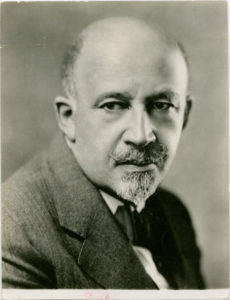On February 23, 1868, William Edward Burghardt Du Bois was born. One of the true titans of American intellectual history, Dr. Du Bois’ life stretched from the high tide of Reconstruction to the middle of the Civil Rights Movement—his death on August 27, 1963 came one day before Martin Luther King, Jr. gave his “I Have a Dream” speech. It is impossible to imagine American history without Du Bois’ outsized influence. Here at the Society of U.S. Intellectual Historians, we celebrate his life by doing some of what we do best: recommending a few books and essays to read by Du Bois and about Du Bois.
Before I begin this list, I must state up front that the works Souls of Black Folk, Black Reconstruction, and Dusk of Dawn will not appear on this list. They are all crucial to understanding his evolving view of racism in American society, but they are also often cited. Instead I want to take the opportunity to point your attention towards some of his  lesser known works, along with books about Du Bois’ life that are important parts of American intellectual history.
lesser known works, along with books about Du Bois’ life that are important parts of American intellectual history.
The World and Africa (1947)—here Du Bois picked up on one of the key themes of his entire public career: the importance of Africa to international affairs. Written just as the Cold War was beginning, and Du Bois was becoming further ostracized during the Second Red Scare, The World and Africa offers his thoughts on Africa’s importance to both world history and the post-World War II world. Considering the ways in which Africa was either ignored or stereotyped in popular discourse, The World and Africa is important to understanding how Du Bois struggled during his entire career to make both academics and lay readers understand the centrality of Africa to world history. This work also shouldn’t be divorced from Du Bois’ post-World War II turn towards Communism, as his skepticism about American foreign policy would be seen in this and other works. See Bill V. Mullen’s Un-American: W.E.B. Du Bois and the Century of World Revolution for more.
The Scholar Denied: W.E.B. Du Bois and the Birth of Modern Sociology—a masterful work by Aldon Morris, here he argues that Du Bois is not only central to the history of American sociology, but founded the field through works such as The Philadelphia Negro. For Morris, the erasure of Du Bois was intentional, done by both white scholars and members of Booker T. Washington’s Tuskegee Machine. A cracking good intellectual history, and a reminder that there is still a great deal to be learned about the origins of modern scholarly traditions.
W.E.B. Du Bois: A Biography—the David Levering Lewis classic is still required reading on his life. Now abridged into one volume, I’d recommend giving it a read if you’re curious about any part of Du Bois’ life.
“The Comet”—a short story by Du Bois which was part of Darkwater, “The Comet” is W.E.B. Du Bois’ attempt at science fiction. Yes. He wrote a piece of science fiction, in this case centered on a black man and a white woman left over after a comet hits Earth and, seemingly, wipes out the rest of humanity.
“The Souls of White Folk”—another essay that later became part of Darkwater, “The Souls of White Folk” is his critique of what we would now call “whiteness.” You could even say it’s a foundational text of that scholarly field. Du Bois’ thoughts about racism and the First World War combine to give a stinging critique to the idea of “European civilization.”

2 Thoughts on this Post
S-USIH Comment Policy
We ask that those who participate in the discussions generated in the Comments section do so with the same decorum as they would in any other academic setting or context. Since the USIH bloggers write under our real names, we would prefer that our commenters also identify themselves by their real name. As our primary goal is to stimulate and engage in fruitful and productive discussion, ad hominem attacks (personal or professional), unnecessary insults, and/or mean-spiritedness have no place in the USIH Blog’s Comments section. Therefore, we reserve the right to remove any comments that contain any of the above and/or are not intended to further the discussion of the topic of the post. We welcome suggestions for corrections to any of our posts. As the official blog of the Society of US Intellectual History, we hope to foster a diverse community of scholars and readers who engage with one another in discussions of US intellectual history, broadly understood.
I’m resolving to read some Du Bois in 2017, not only to fill one of the gaps in my education but also perhaps as a small act of intellectual resistance against the racist/xenophobic-inflected parts of Trump’s agenda.
Always a good idea to read Du Bois! One of the best aspects of his career was that, since it was so long, he wrote about practically every topic you can think of that an intellectual in 20th century America would have tackled.